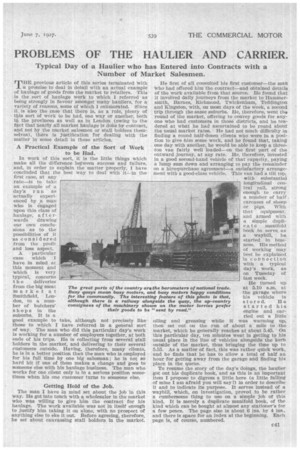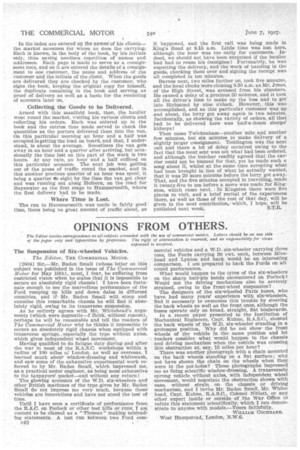PROBLEMS OF THE HAULIER AND CARRIER.
Page 63

Page 64

If you've noticed an error in this article please click here to report it so we can fix it.
Typical Day of a Haulier who has Entered into Contracts with a Number of Market Salesmen.
T"previous article of this series terminated With a promise to deal in detail with an actual example of haulage of goods from the market to retailers. This is the sort of haulage work to which I referred as being strongly in favour amongst many hauliers, for a variety of reasons, some of which I enumerated. Since it is also tha case that there is, as a rule, plenty of
• this sort of work to be had, one way or another, both in the provinces as well as in London (owing to the fact that nearly all Market haulage is done by contract, and not by the market salesmen or stall holders themselves), there is justification for dealing with the matter in some detail in these articles.
A Practical Example of the Sort of Work to be Had.
• In work of this sort, it is the little things which make all the difference between success and failure, and, in order to explain the matter properly, I have concluded that the best way to deal with the first case, at any •
rate—is to take an example of a day's run actually experienced by a man who is engaged upon this class of haulage, afterwards drawing our own conclusions as to the possibilities of it as considered from the profit and loss aspect.
A particular case Which I have in mind at this moment and which is very typical, concerns
t b e deliveries from the big meat market at Smithfield, London, to a number of butchers' shops in the suburbs. It is a good example to take, although not precisely like those to which I have referred in a general sort of way. The man who did this particular day's work is working for a number of employers together, at both ends of his trips. He is collecting from several stall holders in the market, and delivering to their several customers outside. Having, therefore, many clients, he is in a better position than the man who is employed for his full time by one big salesman; he is not so hard hit if one of them makes a change and goes to someone else with his haulage business. The man who works for one client only is in a serious position sometimes when his one customer turns to someone else.
Getting Hold of the Job.
The man I have in mind set about the job in this way. He got into touch with a wholesaler in the market who was willing to give him the contract for his haulage. The work available was not in itself enough to justify him taking it on alone, with no prospect of anything else to eke it out. Before agreeing, therefore, he set about canvassing stall holders in the market.
He first of all consulted his first customer—the man Who had offered him the contract—and obtained details
of the work available from that source. He found that it involved daily journeys from the market to Hammersmith, Barnes, Richmond, Twickenham, Teddington
and Kingston, with, on most ,days of the week, a second trip through the same suburbs. He, therefore, went the round of the market, offering to convey goods for any one who had customers in those districts, and he ten dered at what he had ascertained to be round about the usual market rates. He had not much difficulty in finding a round half-dozen clients who were in a posi tion to give him some work, and he found that, taking one day with another, he would be able to keep a three ton van fairly well loaded—on the first part of the outward journey, at any rate. He, therefore, invested in a good second-hand vehicle of that capacily,. paying a lump sum down and arranging to pay the remainder on a hire-purchase agreement—a satisfactory arrangement with a good-class vehicle. This van had a tilt top, with substantial longitudinal central rail, strong enough to carry a number of half • carcases of sheep or pigs. With that equipment, and armed with a simple dupli cate manifold book to serve, as a waybill, he started in busi ness. His method of working may best be explained in connection with a typical day's work, as on Tuesdayof last week.
He turned up at 5.10 a.m, at the garage where .his vehicle is stored. He started his engine and carried out a little oiling and greasing while it was warming up, then set out on the run of about a mile to the market, which he generally reaches at about 5.4,5. On this particular day, ten minutes went in getting to his usual place in the line of vehicles alongside the kerb outside of the market, thus bringing the time up to 5.55. As a matter of fact, this was rather quick work, and he finds that he has to allow a total of half an hour for getting away from the garage and finding his place in the queue.
To resume the story of the day's doings, the haulier got out his duplicate book, and as this is an important item I propose to digress a little here (a little failing of mine I am afraid you will say!) in order to describe it and to indicate its purpose. It serves instead of a waybill, which, on investigation, proved to he rather a cumbersome thing to use on a simple job of this kind. It is merely a duplicate manifold book, of the kind which can be bought at almost any stationer's for a few pence. The page size is about 6 ins. by 4 ins., and there is space for an index at the beginning. Each page is, of course, numbered. In the index are entered up the naureeof his clients__ the market salesmen for Reim ne does the carrying. Each is known, in the body of the book, by his initials only, thus saving needlees repetition of names and addresses. Each page is made to serve as a consignment note, and on it are entered the details of a consignment to one customer, the name and address-3 of the customer and the initials of the client. When the goods k are delivered they are checked by the customer, who signs the book, keeping the original copy for himself, the duplicate remaining in the book and serving as proof of delivery as well as a basis for the rendering of accounts later on.
Collecting the Goods to be Delivered.
Armed with this manifold book, then, the haulier went round the market, visiting his various clients and collecting his orders. Each was entered up in the book and the entries thus made served to check the quantities as the porters delivered them into the van. On this particular morning an hour and a half was occupied in getting the load on board, and that, I understand, is about the average. Sometimes the van gets away in an hour and a quarter after arriving, but occasionally the time lost on this part of the work is two hours. At any rate, an hour and a half sufficed on this particular occasion. The next job was getting out of the press of traffic round the market, and in this another precious quarter of an hour was spent, it being a quarter 410 eight by the time the van got clear and was running out along Holborn, on the road for Bayswater as the first stage to Hammersmith, where the first delivery had to be made.
Whim Time is Lost.
The run to Hammersmith was made in fairly good time, there being no great amount of traffic about, as it happened, and the first call was being made in King's Road at 8.15 a.m. Little time was lost here, although the hour was too early for customers. Indeed, we should not have been surprised if the haulier had had to rouse his consignee I Fortunately, he was expecting the delivery, and the work of handing in the goods, checking them over and signing the receipt was all completed in ten minutes.
Barnes next, two miles farther on, took five minutes, and the local clocks were chiming 8.30 a.m. as Mr. Jones, of the High Street, was aroused from his slumbers. He caused a delay of a precious 20 minutes, and it took all the driver's time to make up the loss and to get into Richmond by nine o'clock. However, this was accomplished, and as this particular customer was up and about, the lorry got away again in two minutes. Incidentally, as showing the variety of orders, all that had to be delivered here was half-a-dozen cheeps' kidneys I
Then came Twickenham—another mile and another few minutes, but six minutes to make delivery of a slightly larger consignment. Teddington was the next call and there a lot of delay occurred owing to the fact that the meat sent was not what had been ordered, and although the butcher readily agreed that the carrier could not be blamed for that, yet 'he made such a song about it-, whilst at the same time accepting what had been brought inlieu of what he actually wanted, that it was 20 more minutes before the lorry got away. That, and the five minutes occupied in travelling, made it twenty-five to ten before a move was made for Kingston, which came next. . In Kingston there were five places to visit, and a brief recital of the experiences there, as well as those of the rest of that day, will be given in the next contribution,which, I hope, will be
published next week. S.T.R.












































































































